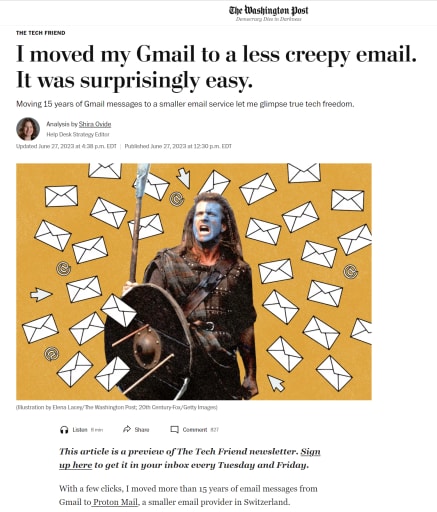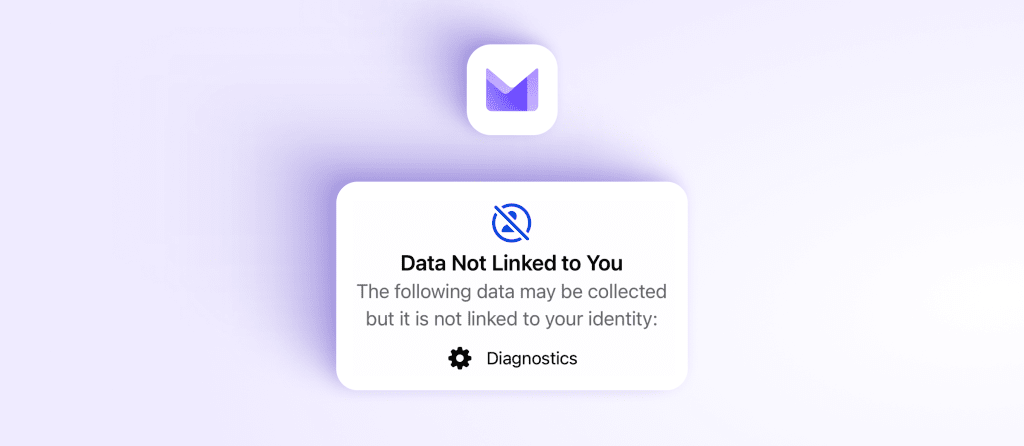With over 4 billion active users(new window) and around 350 million messages sent daily, email is the most successful communications tool ever invented. Yet, it has probably been 15 or 20 years since email has primarily been about communications.
Today, email is identity. Your email address is the one common thread that ties together all the various services you use online and serves as your username or unique identifier stating who you are across the entire internet. You hand it over each time you sign up for a new service online and offline. From this perspective, your email is like your passport in the physical world, but in actuality, far more important than a passport. Losing your passport can be a significant inconvenience, but losing your email account can lead to irrecoverable losses.
Given this importance, whoever controls your digital identity controls your present and future — this is where the main battle for the future of the internet is actually being fought today. Many assumed that when we launched Proton Mail in 2014, our goal was to provide a means for secure communication, but the real battle we have been fighting has always been over digital identity. In that fight, email is far more important than most people realize.
What does Gmail mean to Google?
The easiest way to understand why winning the fight for email is existential to winning the future of the internet is to understand why email is important to Google, the world’s most dominant internet company.
Google’s entire business model revolves around collecting as much personal data about you as possible for surveillance-based advertising(new window).

The cornerstone of this is Gmail because Gmail keeps you logged into Google, allowing Google to connect all of your activity across all Google properties. From Gmail to Google Search, YouTube, Google Maps, Google Photos, Chrome, etc., Google collects masses of personal data(new window) as you use its services, tracking every move you make online. That includes the most sensitive, intimate secrets you may not tell your closest friend or family. Your email connects all this to your real-life identity.
Based on the data collected, Google builds character profiles(new window) of you to sell access to advertisers. The more they know about you, the better they can refine their secret profiles about you.
Furthermore, governments and law enforcers can access this profile and data(new window) if they come knocking with the correct legal paperwork.
What does owning your identity give Google?
The following is the list of data that Google collects via the Gmail app:

But being signed into your Google account (synonymous with Gmail) gives Google a whole lot more. If you have an Android phone, Google can watch you 24/7 as it owns the operating system, monitoring everything from your app usage to text messages to photos. Google may also follow where you go in the real world, even if you turn location services off(new window).
Most disturbing, the tech giant’s spying goes far beyond its own services. Like other Big Tech companies, Google can track you across the web by linking your email address with your IP address(new window), browser and device fingerprints, third-party cookies(new window), and other trackers. But Google’s reach goes further.
When you sign up for an account, that service will typically send you an email to confirm the email address is valid. If you sign up for a service using your Gmail address, these confirmation emails give Google an exhaustive record of all the services you’ve signed up for.
If you use the ubiquitous “Sign up with Google” buttons to log in to a service, you could potentially be exposing even more of your data(new window) and making it even easier for Google to track your external accounts. You can see how many third-party apps Google shares information with by logging in to your Google account and checking its permission center(new window).
Of the top 75,000 sites on the internet, 72% use Google Analytics(new window), which allows Google to collect all kinds of information about users visiting those sites. And millions of websites that run Google ads collect information about anyone on their site through Global Site Tag and many other Google trackers(new window).
As a result, Google can follow you across the internet, recording your personal data on the vast majority of sites you visit, all connected to your real-life identity via Gmail.
Opt out and take back your identity

Switching from Gmail to Proton Mail does more than provide you with more private communication without ads. It lets you move your identity away from Google.
If you aren’t signed into Gmail, Google can no longer connect your activity across the entire internet to your real-life identity, making it more difficult for Google to profile you.
Even if you can’t avoid Google search, YouTube, Google Maps, etc., not signing into a Gmail account means Google cannot connect your activity to your identity because you have separated it from their surveillance machine.
Given that you can now switch from Gmail to Proton Mail(new window) with a single click via Easy Switch thanks to the GDPR.

It’s now easier than ever to free yourself from Google (and also benefit from our end-to-end encrypted Proton Calendar, Proton Drive, Proton Pass, and more).
Proton services are fundamentally different. Our zero-access encryption means that we can’t access any of your data or build a profile on you, even if we wanted to. Proton’s privacy policy is also completely different, built around the model of collecting as little data as possible.

This is possible because our business model is fundamentally different. While our services are also available for free, our business is supported by businesses and individuals who pay us, not advertisers (Proton has no ads and no ad revenue).
Simply put, Proton represents a different vision for the future of the internet, one where you are in control of your identity, as opposed to one where your data is a commodity to be exploited for profit. Email is more than communications, it’s your identity, and that’s worth protecting.







